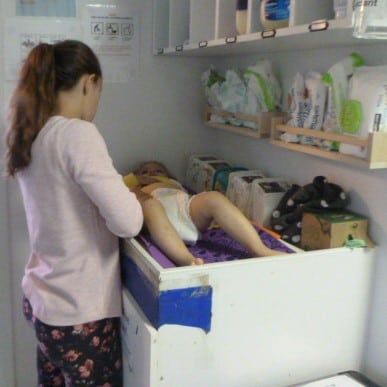Potty Learning Starts with the Diaper Change

Potty learning starts with the diaper change. Each time you change your child, you are helping her understand how her body gets rid of waste, what we need to do to take care of her body, and how she can participate. Talk to your child with respect especially through a diaper change. If we distract a child while we change her, we are telling her she is not responsible for cooperating in taking care of her body and that others can touch and clean her body while she looks at or does something else. A RIE associate remarked during a discussion, “If you shake a rattle in front of your child’s face as they cry while you change them, you are telling them, look over here as I touch you. Your emotions surrounding this are not important. Just look at the rattle.” The RIE principles of respect are especially important in the Our Neighborhood philosophy of diapering and potty learning.
Example of the slow diaper change about 8 months old: Adult goes to baby on the floor and waits for them to make eye contact, “Emily, it is time for your diaper change.” The adult reaches her hands out to Emily and waits for nearly five seconds at which point it becomes clear Emily shifts her body to be picked up. The adult sits Emily down on the table and places her hand behind Emily’s head. After a second, Emily leans back into the adult’s hand and lies down. The adult tells Emily, “Lift your feet up, we will start by taking off your pants.” Emily lifts her feet a bit and the adult encourages her saying, “There you go. Thanks for helping me,” as she removes Emily’s pants. The adult says, “Next is your one-zee,” as she pulls the buttons “one, two, three.” Emily smiles and the adult tucks the one-zee back. Scratching at the tabs on the diaper she says, “Emily can you open your diaper?” Emily is now looking toward the door because she heard something outside. The adult acknowledges her interest but reminds her of the task at hand saying, “Emily, you heard a noise. I heard it too, but I still need your help changing this diaper. Can you find the tabs to open your diaper?” Emily turns back to her caregiver and the adult guides her hands down to the tabs. Each tab is unhooked and the diaper is opened. The adult says, “Your diaper is open, I have a wipe to clean you. Lift up your legs.” Emily lifts her legs and as the adult holds them up she says, “Emily I’m going to wipe your bottom. It might be a little cold.” The adult wipes Emily then tells her, “You’re all clean. I’m going to lift your butt and throw away this diaper. Bye-bye pee pee. There you go. You’re waving.” As the adult grabs the new diaper, shows it to Emily, and opens it up, she says, “I have your new diaper. Can you lift your butt?” Emily lifts her butt and the adult slips the new diaper under her saying, “This is the tricky part. Can you help me find the tabs?” Emily reaches, “You’re reaching down to get them. Thanks for your help.” The adult holds up Emily’s pants and she lifts her feet in the air. “You knew just what to do,” the adult remarks. The adult slips Emily’s legs into her pants. Emily is playing with her hands. The adult reaches her hands out to Emily, “We are almost done. I will help you wash your hands.” Emily reaches her hands up and the adult helps her to stand up saying, “Let’s pull up your pants.” The adult places her hands around Emily’s body and as Emily looks to her, the adult lifts her up and says, “Now it’s time to wash our hands.”
During your child’s diaper changes is when you begin to teach her about whom and how she can and should be touched. During diaper changes is when your child first begins to understand how pee and poop come out of her body and how to keep everyone healthy. We teach children during their early diaper changes to be aware of their body and learn the steps as well as how to help. Diaper changes set up your child to participate in caring for their body whether it’s lifting their legs in the early months, opening the tabs in the later months, or sitting on the potty in the toddler years.
Categories: Potty Learning
Tags:
